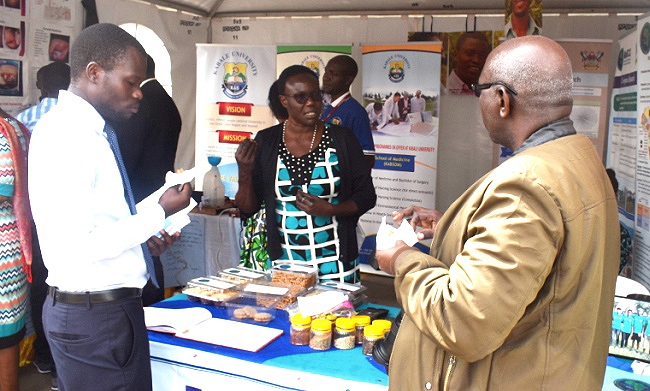Makerere University Regional Centre of Excellence in Crop Improvement (MaRCCI) from 13th to 18th January 2019 represented Mak during the Third Edition of the week-long Parliamentary exhibition. The Parliament of Uganda hosted the exhibition under the theme, “Parliament and Service Delivery”.
The Exhibition which kicked off with a Fundraising Walk in support of people living with Albinism on 13th January 2019 was aimed at showcasing the services that government institutions provide to the public. It was also aimed at providing a valuable opportunity for public interaction with government ministries, departments and agencies.

MaRCCI exhibited value added products from cow pea and sorghum at the exhibition. The MaRCCI Program Administrator, Alice Candia said the centre has been involved in graduate training; mainly MSc. Plant Breeding and Seed systems and PhD in Plant Breeding and Biotechnology since 2008.
The program, she said, has trained more than 181 graduates from over 20 countries in Africa.

“Apart from academic training we carry out extensive research. Right now we are concentrating mainly on two crops; cow pea and sorghum. This is because these are traditional crops with little known about them. There is no info disseminated”, she said.
She described cow pea as an orphan and food security crop that can be grown throughout the year, the main reason the Centre has enormous interest in it.

“MaRCCI is displaying the value addition from cow pea and sorghum. We have made a lot of confectionaries from cowpea and sorghum. We also partner with CURAD based in Kabanyolo to help in marketing our products. Exhibited products include cowpea and sorghum snacks, cookies cake, bagia’ Candia explained.
The Parliamentary week is a key activity aimed at promoting a better understanding of the organ’s role as a public institution; enhancing public awareness about the work of Parliament and encouraging public participation in the law-making process. It is also aimed at making the precincts of Parliament open to the public and giving the opportunity to the public to act as legislators for a day. The event also aims at exposing the public to the daily challenges faced by legislators and improving relations between Parliament and the public.

About MaRCCI
Makerere University won a US$6 million World Bank Grant to support the establishment of the Makerere University Regional Centre for Crop Improvement (MaRCCI) within the College of Agricultural and Environmental Sciences (CAES). The grant provides for additional scientific and support staff as well as for enhancement of facilities and equipment, with the goal of modernizing and expanding the teaching, research and service activities of MaRCCI in a sustainable manner.

The Centre’s general management is administered through the College of Agricultural and Environmental Sciences. The College Principal gives oversight of MaRCCI activities, while the day-to-day operations are managed by Dr. Richard Edema; the Project Manager (PI) and the Centre Director (CD), assisted by the Deputy Director, Prof. Paul Gibson, and the entire MaRCCI team.
The African Centre of Excellence grant to MaRCCI is part of a larger World Bank initiative that supports the development of Centres of Excellence (ACEs) for higher education in Eastern and Southern Africa. Their purpose is to promote regional specialization among participating universities in areas that address particular challenges in regional development, and strengthen the capacities of these universities to deliver high quality training and applied research.

The overarching goal of MaRCCI is to expand, strengthen and transform the PhD Plant Breeding program following the pattern of the highly successful MSc. in Plant Breeding and Seed Systems. Thus, the centre will provide the nations of Eastern and Southern Africa (ESA) with industry-ready plant breeders who are equipped to use cutting edge science to develop and deliver new varieties of food crops. These breeders are urgently needed in order to improve food security, nutrition, and rural incomes, and to address poverty and economic development throughout this region.
Report compiled by;
Jane Anyango
Principal Communication Officers, CAES

 General2 weeks ago
General2 weeks ago
 Natural Sciences2 weeks ago
Natural Sciences2 weeks ago
 Agriculture & Environment1 week ago
Agriculture & Environment1 week ago
 General6 days ago
General6 days ago
 Health2 weeks ago
Health2 weeks ago









